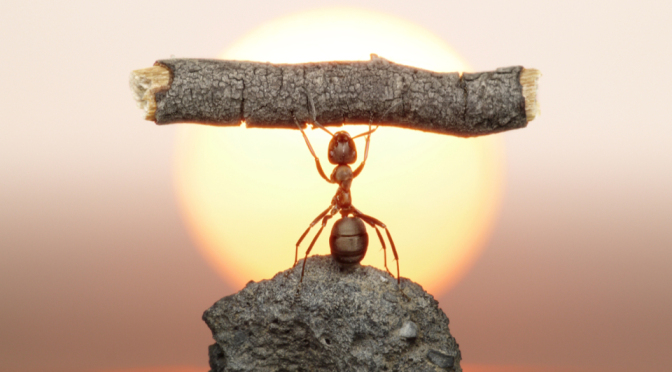I’m thinking our house must sit on top of an ancient Indian ant burial ground. For the past few weeks, tiny specks of pepper have been scurrying around the cat food and finding their way into the house via impossible cracks. On closer inspection, the pepper specks have legs. Exactly six. And antennae. They seem undeterred by copious amounts of poisonous sprays or natural remedies like lemon, cinnamon, or cayenne pepper. The cats have been forced to eat around the creepy crawlies–or simply ingest them as extra protein.
My daughter even discovered ants in her car. Those must have been the Mission Impossible species, clinging to the tire treads at interstate speeds, their antennae flattened by the high winds. Must. Find. Sugar. Source. MI-6 has disavowed all knowledge.
Finally we called the big guns and the exterminator came out to lock down the perimeter. I’m sure whatever force-field she sprayed around the house is probably some neurotoxin that will eventually render us all drooling idiots, but I can no longer handle wiping the counters and finding the paper towel covered in black ants. So for the next few days, we’ll be taking shallow breaths to minimize intake and crossing our fingers that the hideouts have been destroyed.
I should not complain. Where I grew up in Florida, you had to be very careful where you sat or stood outside because chances were good you were probably within attack distance of a fire ant mound. A few months ago, I drove through Alabama and could see their red-dirt mounds alongside the interstate, camouflaged in the tall grass. The sight sent an involuntary shudder through me, and I made sure the windows were rolled up. We were playing tag once, and I fell into one of these cone-shaped piles of sand. Within seconds, the red armies were pouring out like streams of water, stinging wherever they stuck to my skin. Fire ants are so named because the venom they inject actually feels like fire under the skin. A more descriptive name might be Hell Ants or maybe Napalm Ants. Unlike bees, ants do not die when they sting, so they can repeatedly sting while they cling to one spot.
I ran furiously brushing, swatting, and howling to my mother who, dishtowel in hand, whacked me all over to get the clinging monsters off. I know firsthand where the adage “ants in your pants” comes from. To add insult to injury, their stings turn to small blisters that itch like the mother of all mosquito bites. I hate–not too strong a word–hate this kind of ant. Had I, at age seven, been given a flame thrower, I would have taken my revenge with a maniacal laugh—-mwuahahahaha!
Aside from the beaches, Florida is not really meant for human habitation. The heat and humidity breed uncommon insects. One rare lazy morning we all sat at the kitchen bar, excited to have homemade waffles for breakfast. As my mother heated the waffle iron, an odd odor like burning metal started to fill the room. We checked the outlet and the oven– nothing. The green light blinked on the waffle iron signaling it was hot enough to cook waffles. When she lifted the lid, panicked and burning black carpenter ants spilled from the hot surface. The closed waffle iron had been the perfect ready-made nesting area, like an ant farm, with corridors and hallways all laid out. These ants were large, each part of their body like the pearls on a blackberry, and their little feet were toasting as they labored to save their young. We screamed and swatted, smacked and shrieked, as they poured over the counter and onto the floor. My mother practically threw the hot waffle iron at my father, and he ran to throw it outside. We had eggs instead.
nothing. The green light blinked on the waffle iron signaling it was hot enough to cook waffles. When she lifted the lid, panicked and burning black carpenter ants spilled from the hot surface. The closed waffle iron had been the perfect ready-made nesting area, like an ant farm, with corridors and hallways all laid out. These ants were large, each part of their body like the pearls on a blackberry, and their little feet were toasting as they labored to save their young. We screamed and swatted, smacked and shrieked, as they poured over the counter and onto the floor. My mother practically threw the hot waffle iron at my father, and he ran to throw it outside. We had eggs instead.
Like bees, ants are often held up as examples of industrious character. The writer of Proverbs tells the sluggard to consider the ant and her ways: lots of initiative, always busy in every season. I used to spend long hours outside, watching lines of ants marching two by two, hurrah, hurrah! No matter how many drops of water you put on them, or how you tried to divert their path, they were dauntless. Grain by grain, they build their hills patiently and steadily. Like African women along the village roadside, they carry enormous loads balanced above their heads, walking great distances to reach their home.
On the other hand, many species of ants pillage other colonies and steal their eggs. These eggs are then either eaten or the young, once hatched, are forcibly required to work. In other words, they make ant slaves. Except for Antarctica and the Arctic, ants are everywhere. Scientists estimate their numbers on earth to be a paltry quadrillion at any given time. That’s 15 zeros. I checked.
So, while you might see them as industrious little yes-men, I see them as our future insect overlords. While they may seem small and (aside from the fire ants–may curses be upon their tiny heads!) relatively harmless, these invasive, enslaving, cooperative little creatures outnumber us by, well, a lot of zeros. Perhaps I should be nicer to them? My swatting, burning, and spraying may come back to–literally–bite me.









Oh how I hate fire ants!!!! We lived in the country in AL for 7 years. I was constantly stepping on a fire ant bed on my way to the garden or clothesline. Nothing got rid of them.
Very well written Bonnie! Great read